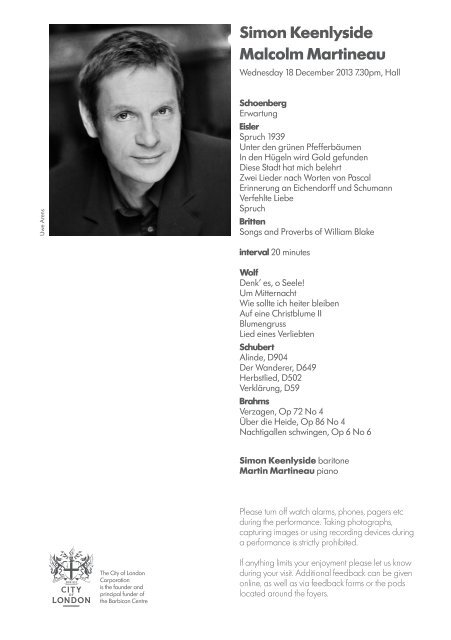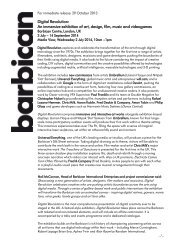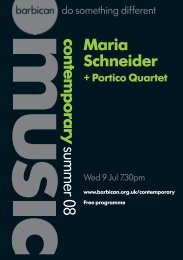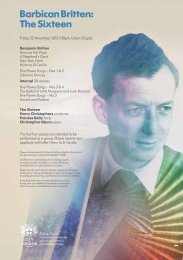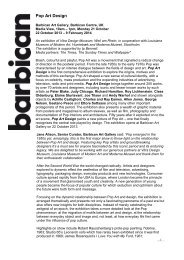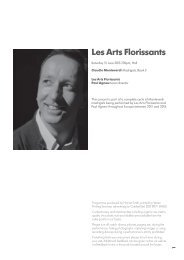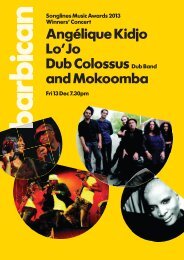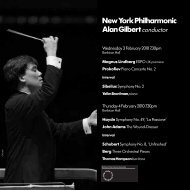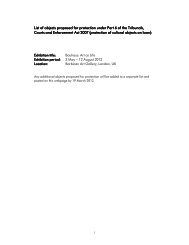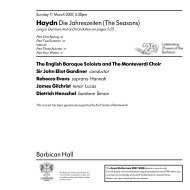Simon Keenlyside Malcolm Martineau - Barbican
Simon Keenlyside Malcolm Martineau - Barbican
Simon Keenlyside Malcolm Martineau - Barbican
Create successful ePaper yourself
Turn your PDF publications into a flip-book with our unique Google optimized e-Paper software.
<strong>Simon</strong> <strong>Keenlyside</strong><br />
<strong>Malcolm</strong> <strong>Martineau</strong><br />
Wednesday 18 December 2013 7.30pm, Hall<br />
Uwe Arens<br />
Schoenberg<br />
Erwartung<br />
Eisler<br />
Spruch 1939<br />
Unter den grünen Pfefferbäumen<br />
In den Hügeln wird Gold gefunden<br />
Diese Stadt hat mich belehrt<br />
Zwei Lieder nach Worten von Pascal<br />
Erinnerung an Eichendorff und Schumann<br />
Verfehlte Liebe<br />
Spruch<br />
Britten<br />
Songs and Proverbs of William Blake<br />
interval 20 minutes<br />
Wolf<br />
Denk’ es, o Seele!<br />
Um Mitternacht<br />
Wie sollte ich heiter bleiben<br />
Auf eine Christblume II<br />
Blumengruss<br />
Lied eines Verliebten<br />
Schubert<br />
Alinde, D904<br />
Der Wanderer, D649<br />
Herbstlied, D502<br />
Verklärung, D59<br />
Brahms<br />
Verzagen, Op 72 No 4<br />
Über die Heide, Op 86 No 4<br />
Nachtigallen schwingen, Op 6 No 6<br />
<strong>Simon</strong> <strong>Keenlyside</strong> baritone<br />
Martin <strong>Martineau</strong> piano<br />
Please turn off watch alarms, phones, pagers etc<br />
during the performance. Taking photographs,<br />
capturing images or using recording devices during<br />
a performance is strictly prohibited.<br />
The City of London<br />
Corporation<br />
is the founder and<br />
principal funder of<br />
the <strong>Barbican</strong> Centre<br />
If anything limits your enjoyment please let us know<br />
during your visit. Additional feedback can be given<br />
online, as well as via feedback forms or the pods<br />
located around the foyers.
First the poetry, then the song<br />
Prima la musica e poi le parole, ‘First the music<br />
and then the words’, is the title of an 18thcentury<br />
libretto by Giambattista Casti, set to<br />
music by Antonio Salieri and, in the 1930s,<br />
the starting-point for Stefan Zweig when<br />
he began work on the libretto for Richard<br />
Strauss’s Capriccio. In Strauss’s case everyone<br />
knows that the phrase is ironic; the words may<br />
be the starting-point but it’s the music that<br />
matters. (Would anyone today willingly endure<br />
one of those long evenings when Richard<br />
Wagner read his latest ‘poem’ to a company<br />
of unswerving enthusiasts or an afternoon<br />
recitation of Piave’s libretto for La traviata?)<br />
However, when a composer turns his talents to<br />
Lieder, mélodies or songs, can we be as certain<br />
that it’s the music first and then the words? For<br />
one thing, with just a handful of exceptions,<br />
the poems that composers have chosen to<br />
set to music were written to stand alone. And<br />
for another it’s the writer who catches the<br />
imagination of the musician and suggests the<br />
music. Prima la poesia. Indeed, one of the<br />
pleasures of a recital such as this evening’s is to<br />
see where a writer/poet leads a musician. The<br />
art of the song would seem to be a genuine<br />
dialogue, rather than a struggle for artistic<br />
supremacy between the musician and the poet.<br />
That said, not all poets whose work is set to<br />
music are great, or even good poets. And<br />
while there are composers with tin ears when<br />
it comes to choosing poetry, they somehow<br />
sometimes polish dull metal into musical silver.<br />
That’s the miracle of Schubert’s Winterreise and<br />
of so many of Richard Strauss’s early songs.<br />
Arnold Schoenberg<br />
The text for Schoenberg’s Erwartung was<br />
written by a poet who spoke for and to a<br />
whole generation of German-speaking<br />
composers. Richard Strauss, Reger, Zemlinsky,<br />
Webern and Kurt Weill as well as Schoenberg<br />
all set Richard Dehmel’s words to music.<br />
His appeal was simple: he was radical in his<br />
politics, a champion of workers’ rights, and<br />
he was fiercely critical of the well-mannered<br />
hypocrisy about human sexuality that<br />
characterised late 19th-century German society.<br />
Love that dared to speak its name in all shapes<br />
and sizes was his principal song, the fulfilment<br />
of desires which encouraged men and women<br />
to unloose the artificial constraints of straitlaced<br />
bourgeois society. Dehmel was twice<br />
prosecuted for obscenity and blasphemy and his<br />
collection Weib und Welt (‘Woman and World’),<br />
published in 1896, was condemned to be burnt.<br />
Three years later Schoenberg set Erwartung<br />
from Weib und Welt to music, together with<br />
two other Dehmel poems; and we shouldn’t<br />
be surprised that the lush late Romantic style<br />
of these songs’ music seems to anticipate<br />
that of the wordless tone-poem Verklärte<br />
2
Nacht, since that string sextet took its cue from<br />
another of the poems in the same collection.<br />
Dehmel’s feelings for man and woman in<br />
nature and the excitement that attends erotic<br />
anticipation (Erwartung) are condensed into<br />
just 20 lines, with each of the five verses a<br />
chapter in the story of a lover waiting for a<br />
sign to enter the red villa by the sea-green<br />
pond. There’s something almost painterly,<br />
and Expressionist, in the poem’s eye for<br />
colour, while the varied rhyme-scheme<br />
only racks up the sexual excitement.<br />
Hanns Eisler<br />
Hanns Eisler studied with Schoenberg for four<br />
years in the early 1920s and was the first of the<br />
composer’s disciples to adopt serialism as a way<br />
of composing. But as a member of the German<br />
Communist Party Eisler was also encouraged to<br />
write music that would be readily understood<br />
by a popular audience. In Berlin by 1925, the<br />
composer embraced jazz and cabaret music<br />
and his music became increasingly political –<br />
to the evident dismay of his former teacher.<br />
Eisler also met Bertolt Brecht in Berlin,<br />
with whom he would collaborate for the<br />
rest of his life, in exile in the USA during<br />
the Second World War and then back in<br />
East Berlin, as it became after 1945.<br />
Unter den grünen Pfefferbäumen, Diese Stadt<br />
hat mich belehrt and In den Hügeln wird Gold<br />
gefunden are three of Brecht’s Hollywood<br />
Elegies, sardonic reflections on the City of the<br />
Angels, where ‘Paradise and hell-fire are the<br />
same city’, written when the poet/playwright and<br />
the composer were living in exile in Los Angeles.<br />
If Brecht’s pungent verse repays a debt<br />
to popular ballads the tone is entirely the<br />
playwright’s. In Spruch – Spruch meaning<br />
proverb – and Spruch 1939, there’s that<br />
knowingness about the ways of the world<br />
that fills the plays, particularly The Good<br />
Person of Szechwan. In den finsteren Zeiten is<br />
truly a proverb for the year that the Second<br />
World War in Europe began. ‘In the dark<br />
times will there also be singing? Yes, there<br />
will also be singing about the dark times.’<br />
Setting Brecht’s poetry may not have been that<br />
much of a choice for Hanns Eisler, joined as<br />
they were at the creative hip in Germany and<br />
then Hollywood, where both Eisler and Brecht<br />
worked on Fritz Lang’s movie Hangmen Also<br />
Die, for which Eisler was nominated for an<br />
Oscar in 1944, and then back in Berlin at the<br />
Berliner Ensemble. Yet there’s an unmistakably<br />
Brechtian tone to both of the passages that<br />
Eisler set from Pascal, Despite these miseries<br />
and The only thing. However, no one can fault<br />
this composer’s taste in setting Eichendorff’s<br />
fragment Erinnerung an Eichendorff und<br />
Schumann and Heine’s infinitely sad lyric about<br />
wasted love, Verfehlte Liebe. Here the composer<br />
is nothing if not his own man as he relishes a<br />
sense of mordant regret present in both writers.<br />
Benjamin Britten<br />
No 20th-century English composer sets<br />
words with more respect for their sounds<br />
and sense than Benjamin Britten. In Britten’s<br />
hands English is no longer die Sprache ohne<br />
Musik! Indeed, almost single-handedly he<br />
banishes that ancient canaille that language<br />
loses its musicality when set to music.<br />
One of the treats to be seen at a centenary<br />
exhibition this summer in the new Britten–Pears<br />
Archive in Aldeburgh was the composer’s copy<br />
of Robert Lowell’s translation of Racine’s tragedy<br />
Phèdre with the composer’s annotations on the<br />
page as he prepared the text that would become<br />
his late cantata Phaedra. An engagement with<br />
the text was clear, but there was also a sense<br />
of one artist inhabiting the words of another.<br />
So we should not be surprised that the shelves<br />
of the Red House where Britten and Peter Pears<br />
lived in Aldeburgh were packed with poetry<br />
3 Programme notes
ooks, reflecting this composer’s lifelong<br />
love for English poetry in particular. As early<br />
as 1935, when he was just into his twenties,<br />
Britten had made a setting of William Blake’s<br />
chilling account of unacknowledged rage in<br />
A Poison Tree, while his darkly erotic version<br />
of The Sick Rose is one of the most disturbing<br />
movements in that early masterpiece, the<br />
Serenade for tenor, horn and strings of 1943.<br />
Twenty years later Britten returned to William<br />
Blake when he began work on Songs and<br />
Proverbs of William Blake, in which settings of<br />
poems from Blake’s Songs of Innocence and of<br />
Experience are punctuated by epigrams from<br />
the undated Proverbs of Hell. Blake’s full title for<br />
the 1794 joint edition of the Songs provides us<br />
with a more than a hint of what these poems<br />
meant to the composer: Songs of Innocence<br />
and of Experience Showing the Two Contrary<br />
States of the Human Soul. We are divided<br />
against ourselves by ‘mind-forg’d manacles’ and<br />
constrained from personal fulfilment by custom<br />
and practice in a society where ‘Prisons are built<br />
with stones of Law [and] brothels with bricks of<br />
Religion’. Blake’s identification of innocence with<br />
childhood surely spoke to a composer whose<br />
abiding theme is the betrayal of innocence.<br />
At the heart – and literally so – of Songs and<br />
Proverbs of William Blake is one of the most<br />
compelling and mysterious of the poet’s lyrics,<br />
The Tyger. ‘What immortal hand or eye, Could<br />
frame thy fearful symmetry?’. How could a<br />
caring creator create the tiger and the lamb?<br />
For Blake, and perhaps Britten too, joy and<br />
terror co-exist in creation. And if the lamb in<br />
the poem conjures up a world of pastoral<br />
innocence, the tiger seems to have been forged<br />
in some divine industrial smithy. Yet next in this<br />
cycle of songs comes the proverb ‘The tygers of<br />
wrath are wiser than the horses of instruction’!<br />
Britten’s response to the ambiguities of Blake’s<br />
verse is to alternate a dislocating chromaticism<br />
with music that is tonally straightforward.<br />
Innocence and experience written into the score,<br />
words and music singing the same song.<br />
Hugo Wolf<br />
Hugo Wolf’s creative life was fast and furious. In<br />
just three years, from 1888 to1891, he composed<br />
over 200 songs that recreate the relationship<br />
between words and music to take account of<br />
the Wagnerian tonal revolution and thus renew<br />
the German Lieder tradition. These songs,<br />
with their carefully wrought introductions,<br />
extended postludes and shifting tonality are<br />
often music dramas in miniature. And their<br />
‘librettists’ can be numbered among the<br />
greatest German lyric poets of the 19th century:<br />
Eichendorff, Mörike and, above all, Goethe.<br />
Johann Wolfgang Goethe, prodigious in his<br />
literary achievements, attracted almost every<br />
serious Lieder composer from Schubert to the<br />
beginning of the last century. Goethe’s lyric<br />
poetry seems to distil the essence of German<br />
Humanism, blending a delight in the natural<br />
world with searching introspection; and always<br />
in an elegant but straightforward language<br />
that seems made for the composer. Indeed,<br />
Goethe himself observed that no lyric poem<br />
was really complete until it was set to music. ‘But<br />
then’, as he said, ‘something unique happens.’<br />
And so it does in Blumengruss, composed<br />
in December 1888, with Wolf building his<br />
song around a short but persistent theme<br />
that mirrors the lover who has stooped<br />
tausendmal – a thousand times – to gather<br />
flowers for a garland for the beloved which<br />
then he has clasped a hundred thousand<br />
times to his breast. And there’s more than a<br />
hint of resignation at the end, suggesting that<br />
this garland is all that he will get to hug.<br />
Wie sollte ich heiter bleiben comes from the last<br />
collection of poetry that Goethe worked on,<br />
the West-östlicher Divan (‘West-Eastern Divan’),<br />
12 books of poetry written between 1814 and<br />
1819 which were inspired by the Persian poet<br />
Hafez, whom Goethe had read in a translation<br />
by Joseph von Hammer. The style of these<br />
poems is quite different from Goethe’s earlier<br />
work, being a mixture of arguments, parables<br />
and religious thoughts that bring together East<br />
and West. Wie sollte ich heiter bleiben is taken<br />
from the ‘Book of Zuleika’ and is of thoughts of<br />
love that the poet is finding it hard to express.<br />
‘When she enticed me to her, There was need<br />
of words. And my tongue faltered, So my quill<br />
did too.’ Wolf matches the this pair of conflicting<br />
desires in his piano part and for once there is a<br />
happy ending to the song, at least musically.<br />
Eduard Mörike belongs to the generation of<br />
German poets after Goethe, although his lyrics<br />
are often compared to the older writers. Born in<br />
1804 he studied theology at Tübingen University<br />
becoming a Lutheran pastor, a career that<br />
held little charm for him. So in 1834 he retired<br />
and devoted the remaining 41 years of his life<br />
4
to literature. His language is plain and simple<br />
and his humour down-to-earth. Yet if Mörike’s<br />
poetry seems genial, sometimes bucolic, there<br />
is also a dark edge to many of his poems,<br />
reminding the reader of a deep wound that<br />
seems to have been caused by his falling in love<br />
and being rejected by Maria Mayer, a barmaid<br />
who belonged to an itinerant religious sect<br />
whom he had met at the age of 19. So Denk’<br />
es, o Seele! invites us to think on the rose bush<br />
that will grow on our grave and the two black<br />
horses that will pull our hearse. A poem that<br />
shines in its modesty which Wolf, ever sensitive<br />
to the nuances of a text, matches with silences.<br />
Um Mitternacht is one of Eduard Mörike’s<br />
greatest poems, complete with the arch-<br />
Romantic imagery of mountains, rushing streams<br />
and dark blue skies at the end of a day. So Wolf<br />
begins his setting with a rocking lullaby theme<br />
that somehow slides into sleep in the postlude.<br />
In Auf eine Christblume II, Mörike remembers<br />
for a second time a Christmas rose that he had<br />
come upon in a churchyard. He transplanted<br />
it to a window box where a wind uprooted<br />
the plant. These simple things lead the poet<br />
to a poem on a butterfly ‘that one day over<br />
hill and dale will shake its velvet wings in<br />
spring nights’. But is this is a meditation on the<br />
sleeping soul suddenly awakened? Wolf builds<br />
his song from a two-bar cell for the piano<br />
marked ‘very tender and throughout pp’. An<br />
immaculate match between words and music.<br />
Lied eines Verliebten is a lover’s song with a<br />
twist, a tale with a sting. The lover wakes with<br />
an aching heart before first light, envying the<br />
carefree fisherman or the miller’s lad still asleep<br />
before their happy working day begins. The<br />
lover tosses and turns in Wolf’s part for the<br />
pianist’s left hand. But the chromatic tonality<br />
suggests that there’s self-pity in this lover’s<br />
lament. As Goethe said, something unique has<br />
happened when Mörike’s words meet music.<br />
Franz Schubert<br />
Schubert is the stone on which all German<br />
Lieder composers have stubbed their toes<br />
since his death in 1828 at the age of just 31.<br />
And you could argue that the choices of poets<br />
made by Schubert would influence the next two<br />
generations of German composers. If Schubert<br />
selected poetry that he admired, he also set<br />
lyrics that he liked, including the work of his<br />
friends. The poem Alinde was written by Johann<br />
Friedrich Rochlitz, a poet, novelist and journalist<br />
from Leipzig, who met Schubert in Vienna in<br />
1822 and who became an enthusiastic supporter<br />
of the composer’s music. Schubert repaid the<br />
compliment and dedicated the completed<br />
song to Rochlitz. If the poem is conventional,<br />
the musical setting is elegantly well matched.<br />
This is a gift of friendship that might be read<br />
and sung in any salon with artistic ambitions.<br />
Friedrich Schlegel is one of the founding fathers<br />
of German Romanticism, a literary critic,<br />
philosopher, philologist and poet, who had a<br />
profound effect on Samuel Taylor Coleridge<br />
and thus upon English Romanticism. Together<br />
with his wife Dorothea – the daughter of the<br />
philosopher Moses Mendelssohn and aunt of<br />
Felix Mendelssohn – and his younger brother<br />
Wilhelm – he established the cultural precedents<br />
for Romanticism and many of its themes and<br />
topics. It was Friedrich Schlegel who declared<br />
that ‘Romantic poetry is a progressive universal<br />
poetry’.<br />
Der Wanderer, not to be confused with the<br />
song with the same title that provided the<br />
chief theme for Schubert’s Wanderer-Fantasie,<br />
is the introductory poem to the second<br />
part of Schlegel’s collection Abendröte.<br />
And if Schubert’s other poet’s ‘wanderers’<br />
are Romantic outsiders, at odds with their<br />
surroundings – as in Winterreise – Schlegel’s<br />
traveller is at one with the world. Here, travelling<br />
is a kind of freedom and not an escape<br />
from heavy days and endless troubles.<br />
Herbstlied was composed in 1816 but had to<br />
wait until 1872 for publication. It is the bestknown<br />
of the settings that the composer made<br />
of poems by Johann Gaudenz Freiherr von<br />
Salis-Seewis, a soldier with literary ambitions.<br />
Salis-Seewis served in the Swiss Guards in Paris<br />
until the Revolution in 1789, and is said to have<br />
been a particular favourite of Marie-Antoinette.<br />
A Wanderjahr through Germany that included<br />
meetings with Herder, Goethe, Schiller and the<br />
poet Wieland in Weimar turned his mind to an<br />
early Romantic style of writing which combined<br />
a deep appreciation of nature with a love of<br />
Heimat. His poetry has an elegiac quality that<br />
surely appealed to Schubert. Autumn is indeed<br />
a time for melancholy, ‘when red leaves fall,<br />
grey mists surge [and] the wind blows colder.’<br />
It was Johann Gottfried Herder himself who<br />
provided the text for Schubert’s Verklärung. But<br />
5 Programme notes
the words are not his. The text is a translation<br />
of Alexander Pope’s poem Transfiguration,<br />
which ends with the celebrated couplet ‘O<br />
grave, where is thy victory? O death, where is<br />
thy sting?’ taken from St Paul’s First Letter to the<br />
Corinthians and which haunted 19th-century<br />
hymn writers. It was from the philosopher<br />
Immanuel Kant, who had taught Herder, that<br />
the younger German writer had acquired his<br />
love of Pope. We can only guess at Schubert’s<br />
reaction to the source of the poem he set as<br />
Verklärung, but its sentiment – exaltation at the<br />
defeat of death – must surely have appealed to<br />
a composer so conscious of his own mortality.<br />
Johannes Brahms<br />
Brahms does not always feel like a natural<br />
songwriter, despite the fact that he composed<br />
over 200 Lieder. There’s little sense of his songs<br />
spilling out from his imagination as they did<br />
for his mentor Schumann. There’s something<br />
hard-earned about this composer’s songs, they<br />
can feel ‘worked’ rather than spontaneous. And<br />
there’s the all-pervading feeling of autumn in<br />
many of them. That may perhaps say something<br />
generally about Brahms as a composer<br />
although Schoenberg would describe him as<br />
the ‘conservative revolutionary’. However, in<br />
no way does it diminish the quality of his best<br />
songs, in which the piano part is invariably at the<br />
service of the poem. And Brahms undoubtedly<br />
had an ear for poetry from his earliest years.<br />
Verzagen (‘Despondency’) was published as one<br />
of a group of four songs in 1877. This gloomy<br />
poem was by the art historian Karl Lemcke who,<br />
after studying and teaching at Heidelberg,<br />
moved to Munich in 1871 where he became a<br />
member of the circle of writers known as Die<br />
Krokodile, taking the nickname ‘Hyena’. Unlike<br />
others of their German generation, notably<br />
the Junges Deutschland Group, the Crocodiles<br />
abjured politics in their poetry. For them it was a<br />
holy art that took its cue from classical, medieval<br />
and even Oriental models. And by the time<br />
Lemcke arrived in Munich there was an odour<br />
of late-Romantic angst in the group’s work<br />
that would surely have appealed to the stoic in<br />
Brahms. As Lemcke writes: ‘Du ungestümes Herz<br />
sei still Und gib dich doch zur Ruh’ (You, unruly<br />
heart, be silent, And surrender yourself to rest).<br />
In Über die Heide, published as one of a set of<br />
six songs in 1882, Brahms returned to his roots<br />
in Northern Germany. Theodor Storm was one<br />
of the most prominent 19th-century German<br />
Realist writers. He was also a child of the same<br />
North Sea plain that had nurtured a young<br />
Brahms, and over the course of 50 novellas and<br />
his poetry, Storm celebrates the austere beauty<br />
of this landscape, the mud flats that seem to<br />
stretch for ever, the sea that constantly threatens<br />
and the hard-won pastures. It is the simplicity of<br />
this vision that makes Über die Heide (‘Over the<br />
heath’), such a fine poem and Brahms rises to<br />
the challenge of setting it to music magnificently.<br />
Nachtigallen schwingen is among the earliest<br />
of Brahms’s songs, from a group of six that<br />
were published in 1853 when the composer<br />
was just 20. Steeped in Romantic writers such<br />
as Eichendorff, Heine and E T A Hoffmann, he<br />
would have also have read August Heinrich<br />
Hoffmann, one of the most popular German<br />
poets in the middle years of the 19th century.<br />
Progressive in his politics, Hoffmann wrote poetry<br />
that can be read as a harbinger of the 1848<br />
revolutions, and indeed it was he who wrote<br />
the words for what has become the German<br />
national anthem. But what his contemporaries<br />
admired in his poetry was the plain and<br />
unadorned manner in which he gave expression<br />
to the ‘passions and aspirations of daily life’.<br />
These virtues are present in Nachtigallen<br />
schwingen. These nightingales are no figment<br />
of the Romantic poet’s overheated imagination,<br />
no ‘immortal birds … not born for death’, but<br />
a simple natural miracle. And by the end of<br />
Brahms’s song, words are just about superfluous:<br />
the music has worked its own magic with them.<br />
Programme note © Christopher Cook<br />
6
Texts<br />
Arnold Schoenberg<br />
Erwartung, Op. 2 No. 1<br />
Aus dem meergrünen Teiche<br />
Neben der roten Villa<br />
Unter der toten Eiche<br />
Scheint der Mond.<br />
Wo ihr dunkles Abbild<br />
Durch das Wasser greift,<br />
Steht ein Mann und streift<br />
Einen Ring von seiner Hand.<br />
Drei Opale blinken;<br />
Durch die bleichen Steine<br />
Schwimmen rot und grüne<br />
Funken und versinken.<br />
Und er küsst sie, und<br />
Seine Augen leuchten<br />
Wie der meergrüne Grund:<br />
Ein Fenster tut sich auf.<br />
Aus der roten Villa<br />
Neben der toten Eiche<br />
Winkt ihm eine bleiche<br />
Frauenhand.<br />
Richard Dehmel (1863–1920)<br />
Hanns Eisler<br />
Spruch 1939<br />
In den finsteren Zeiten,<br />
wird da noch gesungen werden?<br />
Ja! Da wird gesungen werden<br />
von den finsteren Zeiten.<br />
Unter den grünen Pfefferbäumen<br />
Unter den grünen Pfefferbaümen<br />
Gehen die Musiker auf den Strich, zwei und zwei<br />
Mit den Schreibern. Bach<br />
Hat ein Strichquartett im Täschen. Dante schwenkt<br />
Den dürren Hintern.<br />
In den Hügeln wird Gold gefunden<br />
In den Hügeln wird Gold gefunden.<br />
An der Küste findet man Öl.<br />
Expectation<br />
From the sea-green pond<br />
near the red villa<br />
beneath the dead oak<br />
shines the moon.<br />
Where her dark reflection<br />
stretches out through the water<br />
stands a man and takes<br />
a ring from his hand.<br />
Three opals glitter;<br />
through the pale stones<br />
swim red and green<br />
sparks and sink.<br />
And he kisses her,<br />
and his eyes shine<br />
like the sea-green ground:<br />
a window is opened.<br />
From the red villa<br />
near the dead oak<br />
a lady’s hand<br />
waves to him<br />
Proverb 1939<br />
In the dark times<br />
will there also be singing?<br />
Yes, there will also be singing<br />
about the dark times.<br />
Underneath the green pepper trees<br />
Underneath the green pepper trees, daily<br />
the composers are on the beat, two by two<br />
with the writers. Bach<br />
writes concertos for the strumpet. Dante wriggles<br />
his shrivelled arsehole.<br />
In the hills are the gold prospectors<br />
In the hills are the gold prospectors.<br />
By the sea you come upon oil.<br />
7 Texts
Grössere Vermögen<br />
Bringen die Träume vom Glück,<br />
Die man hier auf Zelluloid schreibt.<br />
Diese Stadt hat mich belehrt<br />
Diese Stadt Hollywood hat mich belehrt<br />
Paradies und Hölle können eine Stadt sein.<br />
Für die Mittellosen<br />
Ist das Paradies die Hölle.<br />
Bertolt Brecht (1898–1956)<br />
Greater fortunes far<br />
are won from those dreams of happiness<br />
which are kept on celluloid spools.<br />
This city has made me realise<br />
This city of Hollywood has made me realise:<br />
Paradise and hell-fire are the same city.<br />
For the unsuccessful<br />
Paradise itself serves as hell-fire.<br />
Translations by John Willett<br />
Zwei Lieder nach Worten von Pascal<br />
Despite these miseries<br />
Despite these miseries, man wishes to be happy,<br />
and only wishes to be happy, and cannot wish not<br />
to be so. But how will he set about it? To be happy<br />
he would have to make himself immortal. But,<br />
not being able to do so, it has occurred to him to<br />
prevent himself from thinking of death.<br />
The only thing<br />
The only thing which consoles us for our miseries<br />
is diversion, and yet this is the greatest of our<br />
miseries. For it is this which principally hinders<br />
us from reflecting upon ourselves, and which<br />
makes us insensibly ruin ourselves. Without this<br />
we should be in a state of weariness, and this<br />
weariness would spur us to seek a more solid<br />
means of escaping from it. But diversions amuse<br />
us and lead us unconsciously to death.<br />
Blaise Pascal (1623–62)<br />
Erinnerung an Eichendorff und Schumann<br />
Aus der Heimat hinter den Blitzen rot,<br />
Da kommen die Wolken her.<br />
Aber Vater und Mutter sind lange tot,<br />
Es kennt mich dort niemand mehr.<br />
Joseph von Eichendorff (1788–1857)<br />
Verfehlte Liebe<br />
Zuweilen dünkt es mich, als trübe<br />
Geheime Sehnsucht deinen Blick.<br />
Ich kenn es wohl, dein Missgeschick.<br />
Verfehltes Leben, verfehlte Liebe.<br />
Du blickst so traurig, wiedergeben<br />
Kann ich dir nicht die Jugendzeit.<br />
Unheilbar ist dein Herzleid:<br />
Verfehlte Liebe, verfehlte Leben.<br />
Heinrich Heine (1797–1856)<br />
Souvenir of Eichendorff and Schumann<br />
From my homeland, beyond those streaks of red,<br />
that is where all the clouds appear.<br />
But my mother and father are long since dead<br />
and nobody knows me here.<br />
Translation by John Willett<br />
Wasted love<br />
Sometimes it seems to me that<br />
a secret longing dimmed your glance.<br />
I know your sorrow well.<br />
Wasted life, wasted love.<br />
You look so sad, I cannot<br />
give you back your youth.<br />
Incurable is your pain:<br />
wasted love, wasted life.<br />
Translation by Lindsay Craig<br />
8
Spruch<br />
Dies ist nun alles und ist nicht genug.<br />
Doch sagt es euch vielleicht, ich bin noch da.<br />
Dem gleich ich, der den Backstein mit sich trug<br />
Der Welt zu zeigen, wie sein Haus aussah.<br />
Bertolt Brecht<br />
Benjamin Britten<br />
Songs and Proverbs of William Blake<br />
Proverb I<br />
The pride of the peacock is the glory of God.<br />
The lust of the goat is the bounty of God.<br />
The wrath of the lion is the wisdom of God.<br />
The nakedness of woman is the work of God.<br />
London<br />
I wander thro’ each charter’d street,<br />
Near where the charter’d Thames does flow<br />
And mark in every face I meet<br />
Marks of weakness, marks of woe.<br />
In every cry of every Man,<br />
In every Infant’s cry of fear,<br />
In every voice, in every ban,<br />
The mind-forg’d manacles I hear.<br />
How the Chimney-sweeper’s cry<br />
Every black’ning Church appalls,<br />
And the hapless Soldier’s sigh<br />
Runs in blood down Palace walls.<br />
But most thro’ midnight streets I hear<br />
How the youthful Harlot’s curse<br />
Blasts the new-born Infant’s tear<br />
And blights with plagues the Marriage hearse.<br />
Proverb II<br />
Prisons are built with stones of Law,<br />
Brothels with bricks of Religion.<br />
The Chimney-Sweeper<br />
A little black thing among the snow,<br />
Crying weep weep in notes of woe!<br />
Where are thy father and mother? say?<br />
They are both gone up to the church to pray.<br />
Because I was happy upon the heath,<br />
And smil’d among the winter’s snow<br />
They clothed me in the clothes of death,<br />
And taught me to sing the notes of woe.<br />
Proverb<br />
This, then, is all. It’s not enough, I know.<br />
At least I’m still alive, as you may see.<br />
I’m like the man who took a brick to show<br />
how beautiful his house used once to be.<br />
Translation by John Willett<br />
9 Texts
And because I am happy and dance and sing<br />
They think they have done me no injury,<br />
And are gone to praise God and his Priest<br />
and King<br />
Who make up a heaven of our misery.<br />
Proverb III<br />
The bird a nest, the spider a web, man friendship.<br />
A Poison Tree<br />
I was angry with my friend:<br />
I told my wrath, my wrath did end.<br />
I was angry with my foe:<br />
I told it not, my wrath did grow.<br />
And I water’d it in fears,<br />
Night and morning with my tears;<br />
And I sunned it with smiles,<br />
And with soft deceitful wiles.<br />
And it grew both day and night,<br />
Till it bore an apple bright.<br />
And my foe beheld it shine,<br />
And he knew that it was mine.<br />
And into my garden stole<br />
When the night had veil’d the pole,<br />
In the morning glad I see<br />
My foe outstretch’d beneath the tree.<br />
Proverb IV<br />
Think in the morning. Act in the noon. Eat in the<br />
evening. Sleep in the night.<br />
The Tyger<br />
Tyger! Tyger! burning bright<br />
In the forests of the night:<br />
What immortal hand or eye<br />
Could frame thy fearful symmetry?<br />
In what distant deeps or skies<br />
Burnt the fire of thine eyes?<br />
On what wings dare he aspire?<br />
What the hand dare seize the fire?<br />
And what shoulder, and what art,<br />
Could twist the sinews of thy heart?<br />
And when thy heart began to beat,<br />
What dread hand? and what dread feet?<br />
When the stars threw down their spears,<br />
And water’d heaven with their tears,<br />
Did he smile his work to see?<br />
Did he who made the Lamb make thee?<br />
Tyger! Tyger! burning bright<br />
In the forests of the night:<br />
What immortal hand or eye<br />
Dare frame thy fearful symmetry?<br />
Proverb V<br />
The tygers of wrath are wiser than the horses of<br />
instruction.<br />
If the fool would persist in his folly he would<br />
become wise.<br />
If others had not been foolish, we should be so.<br />
The Fly<br />
Little Fly,<br />
Thy summer’s play<br />
My thoughtless hand<br />
Has brush’d away.<br />
Am not I<br />
A fly like thee?<br />
Or art not thou<br />
A man like me?<br />
For I dance<br />
And drink and sing:<br />
Till some blind hand<br />
Shall brush my wing.<br />
If thought is life<br />
And strength and breath<br />
And the want<br />
Of thought is death;<br />
Then am I<br />
A happy fly,<br />
If I live,<br />
Or if I die.<br />
Proverb VI<br />
The hours of folly are measur’d by the clock; but<br />
of wisdom, no clock can measure.<br />
The busy bee has no time for sorrow.<br />
Eternity is in love with the productions of time.<br />
What the hammer? what the chain?<br />
In what furnace was thy brain?<br />
What the anvil? what dread grasp<br />
Dare its deadly terrors clasp?<br />
10
Ah, Sun-flower<br />
Ah, Sun-flower! weary of time,<br />
Who countest the steps of the Sun;<br />
Seeking after that sweet golden clime,<br />
Where the traveller’s journey is done:<br />
Where the Youth pined away with desire,<br />
And the pale Virgin shrouded in snow,<br />
Arise from their graves and aspire<br />
Where my Sun-flower wishes to go.<br />
Proverb VII<br />
To see a World in a Grain of Sand,<br />
And a Heaven in a Wild Flower,<br />
Hold Infinity in the palm of your hand,<br />
And Eternity in an hour.<br />
Every Night and every Morn<br />
Every Night and every Morn<br />
Some to Misery are Born.<br />
Every Morn and every Night<br />
Some are Born to sweet delight.<br />
Some are Born to sweet delight,<br />
Some are Born to Endless Night.<br />
We are led to Believe a Lie<br />
When we see not Thro’ the Eye,<br />
Which was Born in a Night, to perish in a Night,<br />
When the Soul Slept in Beams of Light.<br />
God Appears and God is Light<br />
To those poor Souls who dwell in Night,<br />
But does a Human Form Display<br />
To those who Dwell in Realms of Day.<br />
William Blake (1757–1827)<br />
interval: 20 minutes<br />
11 Texts
Hugo Wolf<br />
Mörike Lieder: No 39 Denk’ es, o Seele!<br />
Ein Tännlein grünet wo,<br />
Wer weiss, im Walde,<br />
Ein Rosenstrauch, wer sagt,<br />
In welchem Garten?<br />
Sie sind erlesen schon,<br />
Denk’ es, o Seele,<br />
Auf deinem Grab zu wurzeln<br />
Und zu wachsen.<br />
Zwei schwarze Rösslein weiden<br />
Auf der Wiese,<br />
Sie kehren heim zur Stadt<br />
In muntern Sprüngen.<br />
Sie werden schrittweis gehn<br />
Mit deiner Leiche;<br />
Vielleicht, vielleicht noch eh<br />
An ihren Hufen<br />
Das Eisen los wird,<br />
Das ich blitzen sehe!<br />
Consider, O soul<br />
A little fir-tree flourishes,<br />
who knows where, in the wood;<br />
a rosebush, who can tell<br />
in what garden?<br />
They are selected already,<br />
consider, O soul,<br />
to take root and grow<br />
on your grave.<br />
Two young black horses graze<br />
on the pasture,<br />
they return back to town<br />
with lively leaps.<br />
They will go step by step<br />
with your corpse;<br />
perhaps, perhaps even before<br />
on their hooves<br />
the shoe gets loose,<br />
that I can see sparkle.<br />
Translation by Jakob Kellner<br />
No 19 Um Mitternacht<br />
Gelassen stieg die Nacht ans Land,<br />
Lehnt träumend an der Berge Wand,<br />
Ihr Auge sieht die goldne Waage nun<br />
Der Zeit in gleichen Schalen stille ruhn;<br />
Und kecker rauschen die Quellen hervor,<br />
Sie singen der Mutter, der Nacht, ins Ohr<br />
Vom Tage, vom heute gewesenen Tage.<br />
Das uralt alte Schlummerlied,<br />
Sie achtets nicht, sie ist es müd;<br />
Ihr klingt des Himmels Bläue süsser noch,<br />
Der flüchtgen Stunden gleichgeschwungnes Joch.<br />
Doch immer behalten die Quellen das Wort,<br />
Es singen die Wasser im Schlafe noch fort<br />
Vom Tage, vom heute gewesenen Tage.<br />
Eduard Mörike (1804–75)<br />
At midnight<br />
The night ascends calmly over the land,<br />
leaning dreamily against the<br />
wall of the mountain,<br />
its eyes now resting on the golden scales<br />
of time, in a similar poise of quiet peace;<br />
and boldly murmur the springs,<br />
singing to Mother Night, in her ear,<br />
of the day that was today.<br />
To the ancient lullaby<br />
she pays no attention; she is weary.<br />
To her, the blue heaven sounds sweeter,<br />
the curved yoke of fleeing hours.<br />
Yet the springs keep murmuring,<br />
and the water keeps singing in slumber<br />
of the day that was today.<br />
Translation by Emily Ezust<br />
Wie sollte ich heiter bleiben<br />
Wie sollte ich heiter bleiben,<br />
Entfernt von Tag und Licht?<br />
Nun aber will ich schreiben,<br />
Und trinken mag ich nicht.<br />
Wenn sie mich an sich lockte,<br />
War Rede nicht im Brauch,<br />
Und wie die Zunge stockte,<br />
So stockt die Feder auch.<br />
How could I remain cheerful<br />
How could I remain cheerful,<br />
when parted from day and light?<br />
But now I shall write,<br />
and do not wish to drink.<br />
When she enticed me to her,<br />
there was no need of words;<br />
and as my tongue faltered,<br />
so my quill did too.<br />
12
Nur zu! geliebter Schenke,<br />
Den Becher fülle still!<br />
Ich sage nur: Gedenke!<br />
Schon weiss man, was ich will.<br />
Johann Wolfgang von Goethe (1749–1832)<br />
Mörike Lieder: No 21 Auf eine Christblume II<br />
Im Winterboden schläft, ein Blumenkeim,<br />
Der Schmetterling, der einst um Busch und Hügel<br />
In Frühlingsnächten wiegt den samtnen Flügel;<br />
Nie soll er kosten deinen Honigseim.<br />
Wer aber weiss, ob nicht sein zarter Geist,<br />
Wenn jede Zier des Sommers hingesunken,<br />
Dereinst, von deinem leisen Dufte trunken,<br />
Mir unsichtbar, dich blühende umkreist?<br />
Eduard Mörike<br />
Blumengruss<br />
Der Strauss, den ich gepflücket,<br />
Grüsse dich vieltausendmal!<br />
Ich habe mich oft gebücket,<br />
Ach, wohl eintausendmal,<br />
Und ihn ans Herz gedrücket<br />
Wie hunderttausendmal!<br />
Johann Wolfgang von Goethe<br />
Mörike Lieder: No 43 Lied eines Verliebten<br />
In aller Früh, ach, lang vor Tag,<br />
Weckt mich mein Herz, an dich zu denken,<br />
Da doch gesunde Jugend schlafen mag.<br />
Hell ist mein Aug um Mitternacht,<br />
Heller als frühe Morgenglocken:<br />
Wann hättst du je am Tage mein gedacht?<br />
Wär ich ein Fischer, stünd ich auf,<br />
Trüge mein Netz hinab zum Flusse,<br />
Trüg herzlich froh die Fische zum Verkauf.<br />
In der Mühle, bei Licht, der Mühlerknecht<br />
Tummelt sich, alle Gänge klappern;<br />
So rüstig Treiben wär mir eben recht!<br />
Weh, aber ich! o armer Tropf!<br />
Muss auf dem Lager mich müssig grämen,<br />
Ein ungebärdig Mutterkind im Kopf.<br />
Eduard Mörike<br />
But come, dear Saki,<br />
fill my cup in silence!<br />
I’ve only to say: ‘Remember!’<br />
And my meaning is clear.<br />
On a Christmas rose II<br />
There sleeps within the wintry ground,<br />
flower-seed-like,<br />
The butterfly that one day over hill and dale<br />
will flutter its velvet wings in spring nights.<br />
Never shall it taste your viscous honey.<br />
But who knows if perhaps its gentle ghost,<br />
when summer’s loveliness has faded,<br />
Might some day, dizzy with your faint fragrance,<br />
circle, unseen by me, around you as you flower?<br />
Flower greeting<br />
May this garland I have gathered<br />
greet you many thousand times!<br />
I have often stooped down,<br />
ah, at least a thousand times,<br />
and pressed it to my heart<br />
something like a hundred thousand!<br />
Lover’s song<br />
At first dawn, ah! long before day,<br />
my heart wakes me to think of you,<br />
when healthy lads still are sleeping.<br />
My eyes are bright at midnight,<br />
brighter than early morning bells:<br />
when did you ever think of me by day?<br />
If I were a fisherman, I’d get up,<br />
carry my net down to the river,<br />
happily carry the fish to market.<br />
At first light the miller’s lad<br />
is hard at work, the machinery clatters;<br />
such hearty work would suit me well!<br />
But I poor wretch<br />
must lie idly grieving on my bed,<br />
obsessed with that unruly girl!<br />
Translations by Richard Stokes<br />
13 Texts
Franz Schubert<br />
Alinde, D904<br />
Die Sonne sinkt ins tiefe Meer,<br />
Da wollte sie kommen.<br />
Geruhig trabt der Schnitter einher,<br />
Mir ist’s beklommen.<br />
‘Hast, Schnitter, mein Liebchen nicht gesehn?<br />
Alinde, Alinde!’<br />
‘Zu Weib und Kindern muss ich gehn,<br />
Kann nicht nach andern Dirnen sehn;<br />
Sie warten mein unter der Linde.’<br />
Der Mond betritt die Himmelsbahn,<br />
Noch will sie nicht kommen.<br />
Dort legt der Fischer das Fahrzeug an,<br />
Mir ist’s beklommen.<br />
‘Hast, Fischer, mein Liebchen nicht gesehn?<br />
Alinde, Alinde!’<br />
‘Muss suchen, wie mir die Reusen stehn,<br />
Hab nimmer Zeit nach Jungfern zu gehn,<br />
Schau, welch einen Fang ich finde.’<br />
Die lichten Sterne ziehn herauf,<br />
Noch will sie nicht kommen.<br />
Dort eilt der Jäger in rüstigem Lauf,<br />
Mir ist’s beklommen.<br />
‘Hast, Jäger, mein Liebchen nicht gesehn?<br />
Alinde, Alinde!’<br />
‘Muss nach dem bräunlichen Rehbock gehn,<br />
Hab nimmer Lust nach Mädeln zu sehn;<br />
Dort schleicht er im Abendwinde.’<br />
In schwarzer Nacht steht hier der Hain,<br />
Noch will sie nicht kommen.<br />
Von allen Lebendgen irr ich allein,<br />
Bang und beklommen.<br />
‘Dir, Echo, darf ich mein Leid gestehn:<br />
Alinde, Alinde!’<br />
‘Alinde,’ liess Echo leise herüberwehn;<br />
Da sah ich sie mir zur Seite stehn:<br />
‘Du suchtest so treu, nun finde!’<br />
Alinde<br />
The sun sinks into the deep ocean,<br />
she was due to come.<br />
Calmly the reaper walks by.<br />
My heart is heavy.<br />
‘Reaper, have you not seen my love?<br />
Alinda! Alinda!’<br />
‘I must go to my wife and children,<br />
I cannot look for other girls.<br />
They are waiting for me beneath the linden tree.’<br />
The moon entered its heavenly course,<br />
she still does not come.<br />
There a fisherman lands his boat.<br />
My heart is heavy.<br />
‘Fisherman, have you not seen my love?<br />
Alinda! Alinda!’<br />
‘I must see how my oyster baskets are,<br />
I never have time to chase after girls;<br />
look what a catch I have!’<br />
The bright stars appear,<br />
she still does not come.<br />
The huntsman rides swiftly along.<br />
My heart is heavy.<br />
‘Huntsman, have you not seen my love?<br />
Alinda! Alinda!’<br />
‘I must go after the brown roebuck,<br />
I never care to look for girls;<br />
there he goes in the evening breeze!’<br />
The grove lies here in blackest night,<br />
she still does not come.<br />
I wander alone, away from all mankind,<br />
anxious and troubled.<br />
‘To you, Echo, I confess my sorrow:<br />
Alinda! Alinda!’<br />
‘Alinda’, came the soft echo;<br />
Then I saw her at my side.<br />
‘You searched so faithfully. Now you find me.’<br />
Johann Friedrich Rochlitz (1769–1842)<br />
14<br />
Der Wanderer, D649<br />
Wie deutlich des Mondes Licht<br />
Zu mir spricht,<br />
Mich beseelend zu der Reise:<br />
‘Folge treu dem alten Gleise,<br />
Wähle keine Heimat nicht.<br />
Ew’ge Plage<br />
Bringen sonst die schweren Tage;<br />
The traveller<br />
How clearly the moon’s light<br />
speaks to me,<br />
inspiring me on my journey:<br />
‘Follow faithfully the old track,<br />
choose nowhere as your home,<br />
lest bad times<br />
bring endless cares.
Fort zu andern<br />
Sollst du wechseln, sollst du wandern,<br />
Leicht entfliehend jeder Klage.’<br />
Sanfte Ebb’ und hohe Flut,<br />
Tief im Mut,<br />
Wandr’ ich so im Dunkeln weiter,<br />
Steige mutig, singe heiter,<br />
Und die Welt erscheint mir gut.<br />
Alles reine<br />
Seh’ ich mild im Widerscheine,<br />
Nichts verworren<br />
In des Tages Glut verdorren:<br />
Froh umgeben, doch alleine.<br />
Friedrich von Schlegel (1772–1829)<br />
Herbstlied, D502<br />
Bunt sind schon die Wälder,<br />
Gelb die Stoppelfelder,<br />
Und der Herbst beginnt.<br />
Rote Blätter fallen,<br />
Graue Nebel wallen,<br />
Kühler weht der Wind.<br />
Wie die volle Traube<br />
Aus dem Rebenlaube<br />
Purpurfarbig strahlt!<br />
Am Geländer reifen<br />
Pfirsiche mit Streifen<br />
Rot und weiss bemalt.<br />
Sieh, wie hier die Dirne<br />
Emsig Pflaum’ und Birne<br />
In ihr Körbchen legt;<br />
Dort, mit leichten Schritten<br />
Jene goldne Quitten<br />
In den Landhof trägt!<br />
Flinke Träger springen,<br />
Und die Mädchen singen,<br />
Alles jubelt froh!<br />
Bunte Bänder schweben<br />
Zwischen hohen Reben<br />
Auf dem Hut von Stroh.<br />
Johann Gaudenz Freiherr von Salis-Seewis<br />
(1762–1834)<br />
Verklärung, D59<br />
Lebensfunke, vom Himmel entglüht,<br />
Der sich loszuwinden müht!<br />
Zitternd-kühn, vor Sehnen leidend,<br />
Gern und doch mit Schmerzen scheidend –<br />
End’, o end’ den Kampf, Natur!<br />
Sanft ins Leben.<br />
You will move on, and go forth<br />
to other places,<br />
lightly casting off all grief.’<br />
Thus, with gentle ebb and swelling flow<br />
deep within my soul,<br />
I walk on in the darkness.<br />
I climb boldly, singing merrily,<br />
and the world seems good to me.<br />
I see all things clearly<br />
in their gentle reflection.<br />
Nothing is blurred<br />
or withered in the heat of the day:<br />
there is joy all around, yet I am alone.<br />
Autumn song<br />
The woods are already brightly coloured,<br />
the fields of stubble yellow,<br />
and autumn is here.<br />
Red leaves fall,<br />
grey mists surge,<br />
the wind blows colder.<br />
How purple shines<br />
the plump grape<br />
from the vine leaves!<br />
On the espalier<br />
peaches ripen<br />
painted with red and white streaks.<br />
Look how busily the maiden here<br />
gathers plums and pears<br />
in her basket;<br />
look how that one there,<br />
with light steps,<br />
carries golden quinces to the house.<br />
The lads dance nimbly<br />
and the girls sing;<br />
all shout for joy.<br />
Amid the tall vines<br />
coloured ribbons flutter<br />
on hats of straw.<br />
Translations by Richard Wigmore<br />
Transfiguration<br />
Vital spark of heav’nly flame!<br />
Quit, O quit this mortal frame:<br />
Trembling, hoping, ling’ring, flying,<br />
O the pain, the bliss of dying!<br />
Cease, fond Nature, cease thy strife,<br />
And let me languish into life.<br />
15 Texts
Aufwärts schweben<br />
Sanft hinschwinden lass mich nur.<br />
Horch! mir lispeln Geister zu:<br />
‘Schwester-Seele, komm zur Ruh!’<br />
Ziehet was mich sanft von innen?<br />
Was ist’s, was mir meine Sinnen<br />
Mir den Hauch zu rauben droht?<br />
Seele, sprich, ist das der Tod?<br />
Die Welt entweicht! sie ist nicht mehr!<br />
Engel-Einklang um mich her!<br />
Ich schweb’ im Morgenrot! –<br />
Leiht, o leiht mir eure Schwingen:<br />
Ihr Bruder-Geister, helft mir singen:<br />
‘O Grab, wo ist dein Sieg?<br />
Wo ist dein Pfeil, o Tod?<br />
Johann Gottfried Herder (1744–1803)<br />
Hark! they whisper; angels say,<br />
Sister Spirit, come away!<br />
What is this absorbs me quite?<br />
Steals my senses, shuts my sight,<br />
Drowns my spirits, draws my breath?<br />
Tell me, my soul, can this be death?<br />
The world recedes; it disappears!<br />
Heav’n opens on my eyes! my ears<br />
with sounds seraphic ring!<br />
Lend, lend your wings! I mount! I fly!<br />
O Grave! where is thy victory?<br />
O Death! where is thy sting?<br />
Alexander Pope (1688–1744)<br />
Johannes Brahms<br />
Fünf Gesänge, Op 72: No 4 Verzagen<br />
Ich sitz’ am Strande der rauschenden See<br />
Und suche dort nach Ruh’,<br />
Ich schaue dem Treiben der Wogen<br />
Mit dumpfer Ergebung zu.<br />
Die Wogen rauschen zum Strande hin,<br />
Sie schäumen und vergeh’n,<br />
Die Wolken, die Winde darüber,<br />
Die kommen und verweh’n.<br />
Du ungestümes Herz, sei still<br />
Und gib dich doch zur Ruh’;<br />
Du sollst mit Winden und Wogen<br />
Dich trösten – was weinest du?<br />
Despondency<br />
I sit by the shore of the raging sea<br />
Searching there for rest,<br />
I gaze at the waves’ motion<br />
in numb resignation.<br />
The waves crash on the shore,<br />
they foam and vanish,<br />
the clouds, the winds above,<br />
they come and go.<br />
You, unruly heart, be silent<br />
and surrender yourself to rest;<br />
you should find comfort<br />
in winds and waves – why are you weeping?<br />
Karl Lemcke (1831–1913)<br />
Sechs Lieder, Op 86: No 4 Über die Heide<br />
Über die Heide hallet mein Schritt;<br />
Dumpf aus der Erde wandert es mit.<br />
Herbst ist gekommen, Frühling ist weit,<br />
Gab es denn einmal selige Zeit?<br />
Brauende Nebel geisten umher,<br />
Schwarz ist das Kraut und der Himmel so leer.<br />
Wär ich nur hier nicht gegangen im Mai!<br />
Leben und Liebe – wie flog es vorbei!<br />
Over the heath<br />
Over the heath my steps resound;<br />
muffled sounds from the earth wander with me.<br />
Autumn has come, Spring is far distant,<br />
did rapture once really exist?<br />
Swirling mists ghost about,<br />
the heather is black and the sky so empty.<br />
Had I never wandered here in May!<br />
Life and love – how they flew by!<br />
Theodor Storm (1817–88)<br />
16
Sechs Gesänge, Op 6:<br />
No 6 Nachtigallen schwingen<br />
Nachtigallen schwingen<br />
Lustig ihr Gefieder,<br />
Nachtigallen singen<br />
Ihre alten Lieder,<br />
Und die Blumen alle,<br />
Sie erwachen wieder<br />
Bei dem Klang und Schalle<br />
Aller dieser Lieder.<br />
Und meine Sehnsucht wird zur Nachtigall<br />
Und fliegt in die blühende Welt hinein,<br />
Und graft bei den Blumen überall,<br />
Wo mag doch mein mein Blümchen sein?<br />
Und die Nachtigallen<br />
Schwingen ihren Reigen<br />
Unter Laubeshallen<br />
wischen Blütenzweigen,<br />
Vor den Blumen allen<br />
Aber ich muss scheweigen,<br />
Unter ihnen steh ich<br />
Traurig sinnend still;<br />
Eine Blume seh ich,<br />
Die nicht blühen will.<br />
Hoffmann von Fallersleben (1798–1874)<br />
<strong>Barbican</strong> Classical Music Podcasts<br />
Stream or download our <strong>Barbican</strong> Classical Music<br />
Podcasts for exclusive interviews with the world’s greatest<br />
classical stars. Recent artists include Ian Bostridge, Harry<br />
Christophers, Maxim Vengerov, Joyce DiDonato and<br />
many more.<br />
Available on iTunes, Soundcloud and the <strong>Barbican</strong> website<br />
Nightingales joyfully flutter<br />
Nightingales joyfully<br />
flutter their feathers,<br />
nightingales sing<br />
their old songs,<br />
and the flowers<br />
wake again<br />
at the tones and sounds<br />
of all these songs.<br />
And my longing becomes a nightingale<br />
and flies out into the blossoming world,<br />
and asks everywhere of every flower,<br />
where might my own floweret be?<br />
And the nightingales<br />
flutter their dances<br />
beneath leafy arbours<br />
among blossoming boughs,<br />
but I must keep silent<br />
about all the flowers,<br />
I stand among them<br />
sadly lost in silent thought;<br />
I see a flower<br />
that does not wish to bloom.<br />
Translations by Richard Stokes<br />
17 Texts
About the<br />
performers<br />
Uwe Arens<br />
<strong>Simon</strong> <strong>Keenlyside</strong><br />
<strong>Simon</strong> <strong>Keenlyside</strong> baritone<br />
<strong>Simon</strong> <strong>Keenlyside</strong> was born in London. He made<br />
his operatic debut at the Hamburg State Opera<br />
as Count Almaviva (The Marriage of Figaro).<br />
He appears in all the world’s leading opera<br />
houses and has a particularly close association<br />
with the Metropolitan Opera, New York, the<br />
Royal Opera House, Covent Garden, and the<br />
Bavarian and Vienna State Opera houses where<br />
his roles include Prospero (Thomas Adès’s The<br />
Tempest), Posa (Don Carlo), Giorgio Germont<br />
(La traviata), Papageno (The Magic Flute)<br />
and the title-roles in Don Giovanni, Eugene<br />
Onegin, Pelléas et Mélisande, Wozzeck, Billy<br />
Budd, Hamlet, Macbeth and Rigoletto. For his<br />
portrayals of Billy Budd at ENO and Winston<br />
(1984) at the Royal Opera House, he won the<br />
2006 Olivier Award for outstanding achievement<br />
in opera. In 2007 he was given the ECHO Klassik<br />
award for Male Singer of the Year, and in 2011<br />
he was honoured with Musical America’s Vocalist<br />
of the Year Award.<br />
He will return to the Royal Opera House<br />
(Rigoletto), the Vienna State Opera (Count<br />
Almaviva and Rigoletto), the Bayerische<br />
Staatsoper (Ford, Giorgio Germont, Posa, Don<br />
Giovanni and Macbeth) and will make many<br />
further appearances at the Metropolitan Opera.<br />
He enjoys extensive concert work and has sung<br />
under the baton of many of the world’s leading<br />
conductors, appearing with the Chamber<br />
Orchestra of Europe, the City of Birmingham and<br />
London Symphony orchestras, Philharmonia and<br />
Cleveland Orchestras and the Vienna and Berlin<br />
Philharmonic orchestras.<br />
A renowned recitalist, <strong>Simon</strong> <strong>Keenlyside</strong> appears<br />
regularly at the world’s major recital venues.<br />
He has recorded a disc of Schumann Lieder<br />
with Graham Johnson and four recital discs<br />
with <strong>Malcolm</strong> <strong>Martineau</strong>, of Schubert, Strauss,<br />
Brahms, and most recently, an English song disc,<br />
Songs of War, which won a 2012 Gramophone<br />
Award.<br />
He has also recorded Britten’s War Requiem<br />
with the London Symphony Orchestra under<br />
Gianandrea Noseda, Mendelssoh’s Elijah<br />
under Paul McCreesh, Mahler’s Des Knaben<br />
Wunderhorn under Sir <strong>Simon</strong> Rattle, the titlerole<br />
in Don Giovanni under Claudio Abbado,<br />
Carmina burana under Christian Thielemann,<br />
Marcello in La bohème under Riccardo Chailly,<br />
the title-role in Billy Budd under Richard Hickox,<br />
Papageno under Charles Mackerras and Count<br />
Almaviva in the Grammy award-winning The<br />
Marriage of Figaro under René Jacobs.<br />
<strong>Simon</strong> <strong>Keenlyside</strong> was made a CBE in 2003.<br />
18
Russell Duncan<br />
<strong>Malcolm</strong> <strong>Martineau</strong><br />
<strong>Malcolm</strong> <strong>Martineau</strong> piano<br />
<strong>Malcolm</strong> <strong>Martineau</strong> was born in Edinburgh, read<br />
Music at St Catharine’s College, Cambridge, and<br />
studied at the Royal College of Music.<br />
Recognised as one of the leading accompanists<br />
of his generation, he has worked with many of<br />
the world’s greatest singers including Sir Thomas<br />
Allen, Dame Janet Baker, Olaf Bär, Barbara<br />
Bonney, Ian Bostridge, Angela Gheorghiu, Susan<br />
Graham, Thomas Hampson, Della Jones, <strong>Simon</strong><br />
<strong>Keenlyside</strong>, Angelika Kirchschlager, Magdalena<br />
KoΩená, Solveig Kringelborn, Jonathan Lemalu,<br />
Dame Felicity Lott, Christopher Maltman, Karita<br />
Mattila, Lisa Milne, Ann Murray, Anna Netrebko,<br />
Anne Sofie von Otter, Joan Rodgers, Amanda<br />
Roocroft, Michael Schade, Frederica von Stade,<br />
Sarah Walker and Bryn Terfel.<br />
He has presented his own series at the Wigmore<br />
Hall (a Britten and a Poulenc series and ‘Decade<br />
by Decade – 100 years of German Song’,<br />
broadcast by the BBC) and at the Edinburgh<br />
Festival (the complete Lieder of Hugo Wolf). He<br />
has appeared throughout Europe (including at<br />
the <strong>Barbican</strong>, Queen Elizabeth Hall and Royal<br />
Opera House; La Scala, Milan; the Châtelet,<br />
Paris; the Liceu, Barcelona; Berlin’s Philharmonie<br />
and Konzerthaus; Amsterdam’s Concertgebouw<br />
and the Vienna Konzerthaus and Musikverein),<br />
North America (including in New York both Alice<br />
Tully Hall and Carnegie Hall), Australia (including<br />
the Sydney Opera House) and at the Aix-en-<br />
Provence, Vienna, Edinburgh, Schubertiade,<br />
Munich and Salzburg festivals.<br />
Recording projects have included Schubert,<br />
Schumann and English song recitals with Bryn<br />
Terfel (for DG); Schubert and Strauss recitals with<br />
<strong>Simon</strong> <strong>Keenlyside</strong> (for EMI); recital recordings<br />
with Angela Gheorghiu and Barbara Bonney<br />
(for Decca), Magdalena KoΩená (for DG),<br />
Della Jones (for Chandos), Susan Bullock (for<br />
Crear Classics), Solveig Kringelborn (for NMA);<br />
Amanda Roocroft (for Onyx); the complete Fauré<br />
songs with Sarah Walker and Tom Krause; the<br />
complete Britten folk songs for Hyperion; the<br />
complete Beethoven folk songs for DG; the<br />
complete Poulenc songs for Signum; and Britten<br />
song-cycles as well as Schubert’s Winterreise with<br />
Florian Boesch for Onyx.<br />
This season’s engagements include appearances<br />
with <strong>Simon</strong> <strong>Keenlyside</strong>, Sarah Connolly, Dorothea<br />
Röschmann, John Mark Ainsley, Christoph<br />
Prégardien, Michael Schade, Thomas Oliemans,<br />
Kate Royal, Christiane Karg, Florian Boesch,<br />
Iestyn Davies and Anne Schwanewilms<br />
He was a given an honorary doctorate by the<br />
Royal Scottish Academy of Music and Drama<br />
in 2004, and appointed International Fellow of<br />
Accompaniment in 2009.<br />
In 2011 <strong>Malcolm</strong> <strong>Martineau</strong> was Artistic Director<br />
of the Leeds Lieder+ Festival.<br />
19 About the performers
Songs and arias of grace and<br />
power from one of the finest<br />
singers alive. Magdalena Kožená<br />
presents a double portrait of<br />
music from two of the greatest<br />
composers of the 18th century.<br />
barbican.org.uk


